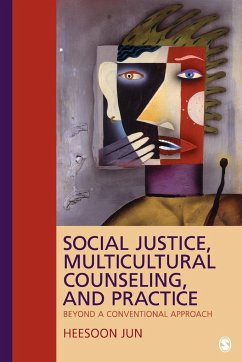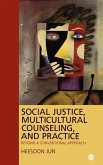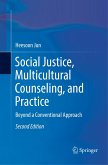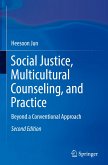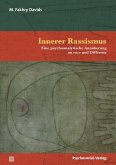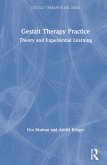- Broschiertes Buch
- Merkliste
- Auf die Merkliste
- Bewerten Bewerten
- Teilen
- Produkt teilen
- Produkterinnerung
- Produkterinnerung
- Weitere 6 Ausgaben:
- Gebundenes Buch
- Gebundenes Buch
- Gebundenes Buch
- Broschiertes Buch
- eBook, PDF
- eBook, PDF
This book takes a new approach to teaching students to think and learn about issues of race and diversity. It aims to break down the traditional categorizations of racial/ethnic groupings and focuses on teaching students to think and learn in a multidimensional manner, rather than in a linear fashion. The key to the book lies in its aim to teach students to practise culturally competent counselling by taking into consideration a client's multiple identities, such as a middle-aged, African American woman, who might be facing issues due to her racial grouping, her age and her gender. The book is…mehr
Andere Kunden interessierten sich auch für
![Social Justice, Multicultural Counseling, and Practice Social Justice, Multicultural Counseling, and Practice]() Heesoon JunSocial Justice, Multicultural Counseling, and Practice157,99 €
Heesoon JunSocial Justice, Multicultural Counseling, and Practice157,99 €![Social Justice, Multicultural Counseling, and Practice Social Justice, Multicultural Counseling, and Practice]() Heesoon JunSocial Justice, Multicultural Counseling, and Practice103,99 €
Heesoon JunSocial Justice, Multicultural Counseling, and Practice103,99 €![Social Justice, Multicultural Counseling, and Practice Social Justice, Multicultural Counseling, and Practice]() Heesoon JunSocial Justice, Multicultural Counseling, and Practice103,99 €
Heesoon JunSocial Justice, Multicultural Counseling, and Practice103,99 €![Innerer Rassismus Innerer Rassismus]() M. Fakhry DavidsInnerer Rassismus39,90 €
M. Fakhry DavidsInnerer Rassismus39,90 €![Die Gruppe und das Unbewusste Die Gruppe und das Unbewusste]() Dieter SandnerDie Gruppe und das Unbewusste69,99 €
Dieter SandnerDie Gruppe und das Unbewusste69,99 €![Heldinnen, Ufos und Straßenschuhe Heldinnen, Ufos und Straßenschuhe]() Holger LindemannHeldinnen, Ufos und Straßenschuhe35,00 €
Holger LindemannHeldinnen, Ufos und Straßenschuhe35,00 €![Gestalt Therapy Practice Gestalt Therapy Practice]() Gro SkottunGestalt Therapy Practice181,99 €
Gro SkottunGestalt Therapy Practice181,99 €-
-
-
This book takes a new approach to teaching students to think and learn about issues of race and diversity. It aims to break down the traditional categorizations of racial/ethnic groupings and focuses on teaching students to think and learn in a multidimensional manner, rather than in a linear fashion. The key to the book lies in its aim to teach students to practise culturally competent counselling by taking into consideration a client's multiple identities, such as a middle-aged, African American woman, who might be facing issues due to her racial grouping, her age and her gender. The book is filled with activities, excercises and examples that help students think about racism in a non-traditional manner, rather than the typical ways often taught, making it very timely and reflecting the transformation of thinking that is occuring in the field.
Hinweis: Dieser Artikel kann nur an eine deutsche Lieferadresse ausgeliefert werden.
Hinweis: Dieser Artikel kann nur an eine deutsche Lieferadresse ausgeliefert werden.
Produktdetails
- Produktdetails
- Verlag: Sage Publications, Inc
- Seitenzahl: 488
- Erscheinungstermin: 1. Juni 2009
- Englisch
- Abmessung: 229mm x 152mm x 26mm
- Gewicht: 700g
- ISBN-13: 9781412960571
- ISBN-10: 1412960576
- Artikelnr.: 26017944
- Verlag: Sage Publications, Inc
- Seitenzahl: 488
- Erscheinungstermin: 1. Juni 2009
- Englisch
- Abmessung: 229mm x 152mm x 26mm
- Gewicht: 700g
- ISBN-13: 9781412960571
- ISBN-10: 1412960576
- Artikelnr.: 26017944
Dr. Heesoon Jun has a Mater's degree in psychology from Radford University in Virginia and a Ph.D. in psychology from the University of Washington in Washington. Currently ,she resides in Washington State where she is a licensed psychologist with a part-time private practice and teaches psychology at Evergreen State College including multicultural counseling. Dr. Jun was born and raised by a religiously tolerant but race/class biased family in Seoul, South Korea. She came to the United States alone to study psychology as an undergraduate where she experienced her status change from the majority to the minority, and privileged to oppressed. Dr. Jun's bicultural and bilingual experiences have been instrumental in facilitating an interest in, (a) the impact of sociocultural contexts on one's own values, beliefs, and automatic thoughts; and (b) how to implement social justice and equity for diversified populations.
Preface Ch 1. Introduction The Millennium and Two Essential Ingredients Unique Structures Suggestions for Using the Book Outline of the Chapters PART I: A PRACTITIONER
S AWARENESS OF HER OWN WORLDVIEW Ch 2. Intrapersonal Communication (Inner Dialogue) Intrapersonal Communication and Values, Beliefs, and Biases Intrapersonal Communication and Ethnocentrism Ch 3. Assessment of a Practitioner
s Values, Beliefs, and Biases Barriers to an Individual
s Self-Assessment of Her Own Values, Beliefs, and Biases Awareness of Inner Experience Self-Assessment of Values, Beliefs, and Biases The Impact of a Practitioner
s Values, Beliefs, and Biases on Assessing and Treating Clients PART II: A PRACTITIONER
S AWARENESS OF SYSTEMATIC OPRESSION/PRIVILEGE AND INTERNALIZED OPPRESSION/PRIVILEGE Ch 4: Racism Race and Racism Social Categorization Theory Variations Within and Among Races Racism and Racial Prejudice and Inappropriate Thinking Styles/Patterns Strategies for and Benefits of Dismantling Racism and Racial Prejudice for Whites A Practitioner
s Assessment of Self in Relation to White Oppression/Privilege Ch 5. Sexism Difference Among Sex, Gender, and Sexism Social Construction of Gender Social Comparison Theory Systematic Oppression/Privilege and Internalized Oppression/Privilege The Intersection of Gender and Race Variations Among Men, Among Women, and Between Men and Women Sexism and Inappropriate Thinking Styles/Patterns Strategies for and Benefits of Dismantling Sexism A Practitioner
s Assessment of Self in Relation to Sexism, Systematic Oppression/Privilege and Internalized Oppression/Privilege Ch 6. Heterosexism Difference Among Sexual Orientation, Homophobia, and Heterosexism Social Construction of Heterosexism Intersections of Race, Gender, and Sexual Orientation Systematic Oppression/Privilege and Internalized Privilege/Oppression Intersections of Race, Gender, and Sexual Orientation Systematic Oppression/Privilege and Internalized Oppression/Privilege Variations Within and Among Nonheterosexuals Heterosexism or Homophobia and Inappropriate Thinking Styles/Patterns Strategies for and Benefits of Dismantling Heterosexism A Practitioner
s Assessment of Self in Relation to Heterosexism, Systematic Oppression/Privilege, and Internalized Oppression/Privilege Ch 7. Classism A Definition of Class and Classism Social Construction of Classism Systematic Oppression/Privilege and Internalized Oppression/Privilege Intersections of Race, Gender, Sexual Orientation, and Class Variations Within and Among Classes Classism and Inappropriate Thinking Styles/Patterns Strategies for and Benefits of Dismantling Classism A Practitioner
s Assessment of Self in Relation to Classism, Systematic Oppression/Privilege and Internalized Oppression/Privilege Ch 8. Ableism Difference Between Disability and Ableism Social Construction of Ableism Systematic Oppression/Privilege and Internalized Oppression/Privilege Intersections of Impairment/Disability, Race, Gender, Sexual Orientation, and Class Variations Within and Among Individuals With Impairment/Disability Ableism and Inappropriate Thinking Styles/Patterns Strategies for and Benefits of Dismantling Ableism A Practitioner
s Assessment of Self in Relation to Ableism, Systematic Oppression/Privilege and Internalized Oppression/Privilege Ch 9. Other "Isms" Due to Age, Language, Religion, and Region Other "Isms" Social Construction of "Isms" Systematic Oppression/Privilege and Internalized Oppression/Privilege Intersections of Race, Gender, Sexual Orientation, Class, Impairment/Disability, and Other Identities Variations Within and Among Age, Language, Religion, and Region Other "Isms" and Inappropriate Thinking Styles/Patterns Strategies for and Benefits of Dismantling "Isms" A Practitioner
s Assessment of Self in Relation to Other "Isms", Systematic Oppression/Privilege, and Internalized Oppression/Privilege Ch 10. Deconstructing Inappropriate Hierarchical, Dichotomous, and Linear Thinking Styles/Patterns Reasons for Change Deconstructing Through Transformative Learning Internalized Oppression/Privilege and Thinking Styles/Patterns Diligent and Mindful Practice Transformation at the Institutional Level PART III: A PRACTITIONER
S AWARENESS OF THE CLIENT
S WORLDVIEW Ch 11. Identity Development Identity Development Models of Identity Development for Nondominant Monoracial Groups Models of Identity Development for Biracial and Multiracial Groups Models of Identity Development for Whites Models of Identity Development for Gays and Lesbians Variations Among and Within Racial Groups Similarities and Differences Between Dominant Group and Nondominant Group Identity Development Ch 12. Multiple Identities Challenges of Assessing Multiple Identities Fluidity of Identity Development Ch 13. Culturally Appropriate Assessment Foundations for Accurate Assessment Assessment in Relation to Race, Gender, Sexual Orientation, Class, Disability/Impairment, Age, Language, Religion, Region, and Their Multiple Intersections Assessment of the Intersections of Multiple Identities (Race, Gender, Class, Sexual Orientation, Impairment/Disability, Age, Language, Religion, and Region) Rating Scales for Thinking Styles, Multiple Identities, Dominant Identities Rating Scale for Acculturation The Diagnostic and Statistical Manual of Mental Disorders (DSM-IV-TR) and Its Appropriateness as an Assessment Tool for Multicultural Populations ACA, APA, and NASW Ethics Codes and Cultural Sensitivity Ch 14. Culturally Appropriate Treatment/Healing Culturally Appropriate Treatment To Be a Multiculturally Competent Practitioner Experiental Learning Through Case Studies About the Author
S AWARENESS OF HER OWN WORLDVIEW Ch 2. Intrapersonal Communication (Inner Dialogue) Intrapersonal Communication and Values, Beliefs, and Biases Intrapersonal Communication and Ethnocentrism Ch 3. Assessment of a Practitioner
s Values, Beliefs, and Biases Barriers to an Individual
s Self-Assessment of Her Own Values, Beliefs, and Biases Awareness of Inner Experience Self-Assessment of Values, Beliefs, and Biases The Impact of a Practitioner
s Values, Beliefs, and Biases on Assessing and Treating Clients PART II: A PRACTITIONER
S AWARENESS OF SYSTEMATIC OPRESSION/PRIVILEGE AND INTERNALIZED OPPRESSION/PRIVILEGE Ch 4: Racism Race and Racism Social Categorization Theory Variations Within and Among Races Racism and Racial Prejudice and Inappropriate Thinking Styles/Patterns Strategies for and Benefits of Dismantling Racism and Racial Prejudice for Whites A Practitioner
s Assessment of Self in Relation to White Oppression/Privilege Ch 5. Sexism Difference Among Sex, Gender, and Sexism Social Construction of Gender Social Comparison Theory Systematic Oppression/Privilege and Internalized Oppression/Privilege The Intersection of Gender and Race Variations Among Men, Among Women, and Between Men and Women Sexism and Inappropriate Thinking Styles/Patterns Strategies for and Benefits of Dismantling Sexism A Practitioner
s Assessment of Self in Relation to Sexism, Systematic Oppression/Privilege and Internalized Oppression/Privilege Ch 6. Heterosexism Difference Among Sexual Orientation, Homophobia, and Heterosexism Social Construction of Heterosexism Intersections of Race, Gender, and Sexual Orientation Systematic Oppression/Privilege and Internalized Privilege/Oppression Intersections of Race, Gender, and Sexual Orientation Systematic Oppression/Privilege and Internalized Oppression/Privilege Variations Within and Among Nonheterosexuals Heterosexism or Homophobia and Inappropriate Thinking Styles/Patterns Strategies for and Benefits of Dismantling Heterosexism A Practitioner
s Assessment of Self in Relation to Heterosexism, Systematic Oppression/Privilege, and Internalized Oppression/Privilege Ch 7. Classism A Definition of Class and Classism Social Construction of Classism Systematic Oppression/Privilege and Internalized Oppression/Privilege Intersections of Race, Gender, Sexual Orientation, and Class Variations Within and Among Classes Classism and Inappropriate Thinking Styles/Patterns Strategies for and Benefits of Dismantling Classism A Practitioner
s Assessment of Self in Relation to Classism, Systematic Oppression/Privilege and Internalized Oppression/Privilege Ch 8. Ableism Difference Between Disability and Ableism Social Construction of Ableism Systematic Oppression/Privilege and Internalized Oppression/Privilege Intersections of Impairment/Disability, Race, Gender, Sexual Orientation, and Class Variations Within and Among Individuals With Impairment/Disability Ableism and Inappropriate Thinking Styles/Patterns Strategies for and Benefits of Dismantling Ableism A Practitioner
s Assessment of Self in Relation to Ableism, Systematic Oppression/Privilege and Internalized Oppression/Privilege Ch 9. Other "Isms" Due to Age, Language, Religion, and Region Other "Isms" Social Construction of "Isms" Systematic Oppression/Privilege and Internalized Oppression/Privilege Intersections of Race, Gender, Sexual Orientation, Class, Impairment/Disability, and Other Identities Variations Within and Among Age, Language, Religion, and Region Other "Isms" and Inappropriate Thinking Styles/Patterns Strategies for and Benefits of Dismantling "Isms" A Practitioner
s Assessment of Self in Relation to Other "Isms", Systematic Oppression/Privilege, and Internalized Oppression/Privilege Ch 10. Deconstructing Inappropriate Hierarchical, Dichotomous, and Linear Thinking Styles/Patterns Reasons for Change Deconstructing Through Transformative Learning Internalized Oppression/Privilege and Thinking Styles/Patterns Diligent and Mindful Practice Transformation at the Institutional Level PART III: A PRACTITIONER
S AWARENESS OF THE CLIENT
S WORLDVIEW Ch 11. Identity Development Identity Development Models of Identity Development for Nondominant Monoracial Groups Models of Identity Development for Biracial and Multiracial Groups Models of Identity Development for Whites Models of Identity Development for Gays and Lesbians Variations Among and Within Racial Groups Similarities and Differences Between Dominant Group and Nondominant Group Identity Development Ch 12. Multiple Identities Challenges of Assessing Multiple Identities Fluidity of Identity Development Ch 13. Culturally Appropriate Assessment Foundations for Accurate Assessment Assessment in Relation to Race, Gender, Sexual Orientation, Class, Disability/Impairment, Age, Language, Religion, Region, and Their Multiple Intersections Assessment of the Intersections of Multiple Identities (Race, Gender, Class, Sexual Orientation, Impairment/Disability, Age, Language, Religion, and Region) Rating Scales for Thinking Styles, Multiple Identities, Dominant Identities Rating Scale for Acculturation The Diagnostic and Statistical Manual of Mental Disorders (DSM-IV-TR) and Its Appropriateness as an Assessment Tool for Multicultural Populations ACA, APA, and NASW Ethics Codes and Cultural Sensitivity Ch 14. Culturally Appropriate Treatment/Healing Culturally Appropriate Treatment To Be a Multiculturally Competent Practitioner Experiental Learning Through Case Studies About the Author
Chapter 1. Introduction: Still Partially Visible.- Part I: A Provider's Awareness of Her Own Worldview.- Chapter 2. Intrapersonal Communication (Inner Dialogue or Inner Speech).- Chapter 3. Assessment of a Provider's Values, Beliefs, and Biases.- Part II: A Provider's Awareness of Systemic Oppression/Privilege and Internalized Oppression/Privilege.- Chapter 4. Racism.- Chapter 5. Sexism.- Chapter 6. Cissexism (Genderism or Binarism).- Chapter 7. Heterosexism.- Chapter 8. Classism.- Chapter 9. Disablism/Ableism.- Chapter 10. Other "isms" due to Age, Language, Religion, and Region.- Chapter 11. Theory to Practice: Deconstructing Inappropriate Hierarchical, Dichotomous, and Linear Thinking Styles/Patterns.- Part III: A Provider's Awareness of the Client's Worldview.- Chapter 12. Identity Construction and Multiple Identities.- Chapter 13. Culturally Appropriate Assessment.- Chapter 14. Culturally Appropriate Treatment/Healing.
Chapter 1. Introduction: Still Partially Visible.- Part I: A Provider's Awareness of Her Own Worldview.- Chapter 2. Intrapersonal Communication (Inner Dialogue or Inner Speech).- Chapter 3. Assessment of a Provider's Values, Beliefs, and Biases.- Part II: A Provider's Awareness of Systemic Oppression/Privilege and Internalized Oppression/Privilege.- Chapter 4. Racism.- Chapter 5. Sexism.- Chapter 6. Cissexism (Genderism or Binarism).- Chapter 7. Heterosexism.- Chapter 8. Classism.- Chapter 9. Disablism/Ableism.- Chapter 10. Other “isms” due to Age, Language, Religion, and Region.- Chapter 11. Theory to Practice: Deconstructing Inappropriate Hierarchical, Dichotomous, and Linear Thinking Styles/Patterns.- Part III: A Provider's Awareness of the Client's Worldview.- Chapter 12. Identity Construction and Multiple Identities.- Chapter 13. Culturally Appropriate Assessment.- Chapter 14. Culturally Appropriate Treatment/Healing.
Preface Ch 1. Introduction The Millennium and Two Essential Ingredients Unique Structures Suggestions for Using the Book Outline of the Chapters PART I: A PRACTITIONER
S AWARENESS OF HER OWN WORLDVIEW Ch 2. Intrapersonal Communication (Inner Dialogue) Intrapersonal Communication and Values, Beliefs, and Biases Intrapersonal Communication and Ethnocentrism Ch 3. Assessment of a Practitioner
s Values, Beliefs, and Biases Barriers to an Individual
s Self-Assessment of Her Own Values, Beliefs, and Biases Awareness of Inner Experience Self-Assessment of Values, Beliefs, and Biases The Impact of a Practitioner
s Values, Beliefs, and Biases on Assessing and Treating Clients PART II: A PRACTITIONER
S AWARENESS OF SYSTEMATIC OPRESSION/PRIVILEGE AND INTERNALIZED OPPRESSION/PRIVILEGE Ch 4: Racism Race and Racism Social Categorization Theory Variations Within and Among Races Racism and Racial Prejudice and Inappropriate Thinking Styles/Patterns Strategies for and Benefits of Dismantling Racism and Racial Prejudice for Whites A Practitioner
s Assessment of Self in Relation to White Oppression/Privilege Ch 5. Sexism Difference Among Sex, Gender, and Sexism Social Construction of Gender Social Comparison Theory Systematic Oppression/Privilege and Internalized Oppression/Privilege The Intersection of Gender and Race Variations Among Men, Among Women, and Between Men and Women Sexism and Inappropriate Thinking Styles/Patterns Strategies for and Benefits of Dismantling Sexism A Practitioner
s Assessment of Self in Relation to Sexism, Systematic Oppression/Privilege and Internalized Oppression/Privilege Ch 6. Heterosexism Difference Among Sexual Orientation, Homophobia, and Heterosexism Social Construction of Heterosexism Intersections of Race, Gender, and Sexual Orientation Systematic Oppression/Privilege and Internalized Privilege/Oppression Intersections of Race, Gender, and Sexual Orientation Systematic Oppression/Privilege and Internalized Oppression/Privilege Variations Within and Among Nonheterosexuals Heterosexism or Homophobia and Inappropriate Thinking Styles/Patterns Strategies for and Benefits of Dismantling Heterosexism A Practitioner
s Assessment of Self in Relation to Heterosexism, Systematic Oppression/Privilege, and Internalized Oppression/Privilege Ch 7. Classism A Definition of Class and Classism Social Construction of Classism Systematic Oppression/Privilege and Internalized Oppression/Privilege Intersections of Race, Gender, Sexual Orientation, and Class Variations Within and Among Classes Classism and Inappropriate Thinking Styles/Patterns Strategies for and Benefits of Dismantling Classism A Practitioner
s Assessment of Self in Relation to Classism, Systematic Oppression/Privilege and Internalized Oppression/Privilege Ch 8. Ableism Difference Between Disability and Ableism Social Construction of Ableism Systematic Oppression/Privilege and Internalized Oppression/Privilege Intersections of Impairment/Disability, Race, Gender, Sexual Orientation, and Class Variations Within and Among Individuals With Impairment/Disability Ableism and Inappropriate Thinking Styles/Patterns Strategies for and Benefits of Dismantling Ableism A Practitioner
s Assessment of Self in Relation to Ableism, Systematic Oppression/Privilege and Internalized Oppression/Privilege Ch 9. Other "Isms" Due to Age, Language, Religion, and Region Other "Isms" Social Construction of "Isms" Systematic Oppression/Privilege and Internalized Oppression/Privilege Intersections of Race, Gender, Sexual Orientation, Class, Impairment/Disability, and Other Identities Variations Within and Among Age, Language, Religion, and Region Other "Isms" and Inappropriate Thinking Styles/Patterns Strategies for and Benefits of Dismantling "Isms" A Practitioner
s Assessment of Self in Relation to Other "Isms", Systematic Oppression/Privilege, and Internalized Oppression/Privilege Ch 10. Deconstructing Inappropriate Hierarchical, Dichotomous, and Linear Thinking Styles/Patterns Reasons for Change Deconstructing Through Transformative Learning Internalized Oppression/Privilege and Thinking Styles/Patterns Diligent and Mindful Practice Transformation at the Institutional Level PART III: A PRACTITIONER
S AWARENESS OF THE CLIENT
S WORLDVIEW Ch 11. Identity Development Identity Development Models of Identity Development for Nondominant Monoracial Groups Models of Identity Development for Biracial and Multiracial Groups Models of Identity Development for Whites Models of Identity Development for Gays and Lesbians Variations Among and Within Racial Groups Similarities and Differences Between Dominant Group and Nondominant Group Identity Development Ch 12. Multiple Identities Challenges of Assessing Multiple Identities Fluidity of Identity Development Ch 13. Culturally Appropriate Assessment Foundations for Accurate Assessment Assessment in Relation to Race, Gender, Sexual Orientation, Class, Disability/Impairment, Age, Language, Religion, Region, and Their Multiple Intersections Assessment of the Intersections of Multiple Identities (Race, Gender, Class, Sexual Orientation, Impairment/Disability, Age, Language, Religion, and Region) Rating Scales for Thinking Styles, Multiple Identities, Dominant Identities Rating Scale for Acculturation The Diagnostic and Statistical Manual of Mental Disorders (DSM-IV-TR) and Its Appropriateness as an Assessment Tool for Multicultural Populations ACA, APA, and NASW Ethics Codes and Cultural Sensitivity Ch 14. Culturally Appropriate Treatment/Healing Culturally Appropriate Treatment To Be a Multiculturally Competent Practitioner Experiental Learning Through Case Studies About the Author
S AWARENESS OF HER OWN WORLDVIEW Ch 2. Intrapersonal Communication (Inner Dialogue) Intrapersonal Communication and Values, Beliefs, and Biases Intrapersonal Communication and Ethnocentrism Ch 3. Assessment of a Practitioner
s Values, Beliefs, and Biases Barriers to an Individual
s Self-Assessment of Her Own Values, Beliefs, and Biases Awareness of Inner Experience Self-Assessment of Values, Beliefs, and Biases The Impact of a Practitioner
s Values, Beliefs, and Biases on Assessing and Treating Clients PART II: A PRACTITIONER
S AWARENESS OF SYSTEMATIC OPRESSION/PRIVILEGE AND INTERNALIZED OPPRESSION/PRIVILEGE Ch 4: Racism Race and Racism Social Categorization Theory Variations Within and Among Races Racism and Racial Prejudice and Inappropriate Thinking Styles/Patterns Strategies for and Benefits of Dismantling Racism and Racial Prejudice for Whites A Practitioner
s Assessment of Self in Relation to White Oppression/Privilege Ch 5. Sexism Difference Among Sex, Gender, and Sexism Social Construction of Gender Social Comparison Theory Systematic Oppression/Privilege and Internalized Oppression/Privilege The Intersection of Gender and Race Variations Among Men, Among Women, and Between Men and Women Sexism and Inappropriate Thinking Styles/Patterns Strategies for and Benefits of Dismantling Sexism A Practitioner
s Assessment of Self in Relation to Sexism, Systematic Oppression/Privilege and Internalized Oppression/Privilege Ch 6. Heterosexism Difference Among Sexual Orientation, Homophobia, and Heterosexism Social Construction of Heterosexism Intersections of Race, Gender, and Sexual Orientation Systematic Oppression/Privilege and Internalized Privilege/Oppression Intersections of Race, Gender, and Sexual Orientation Systematic Oppression/Privilege and Internalized Oppression/Privilege Variations Within and Among Nonheterosexuals Heterosexism or Homophobia and Inappropriate Thinking Styles/Patterns Strategies for and Benefits of Dismantling Heterosexism A Practitioner
s Assessment of Self in Relation to Heterosexism, Systematic Oppression/Privilege, and Internalized Oppression/Privilege Ch 7. Classism A Definition of Class and Classism Social Construction of Classism Systematic Oppression/Privilege and Internalized Oppression/Privilege Intersections of Race, Gender, Sexual Orientation, and Class Variations Within and Among Classes Classism and Inappropriate Thinking Styles/Patterns Strategies for and Benefits of Dismantling Classism A Practitioner
s Assessment of Self in Relation to Classism, Systematic Oppression/Privilege and Internalized Oppression/Privilege Ch 8. Ableism Difference Between Disability and Ableism Social Construction of Ableism Systematic Oppression/Privilege and Internalized Oppression/Privilege Intersections of Impairment/Disability, Race, Gender, Sexual Orientation, and Class Variations Within and Among Individuals With Impairment/Disability Ableism and Inappropriate Thinking Styles/Patterns Strategies for and Benefits of Dismantling Ableism A Practitioner
s Assessment of Self in Relation to Ableism, Systematic Oppression/Privilege and Internalized Oppression/Privilege Ch 9. Other "Isms" Due to Age, Language, Religion, and Region Other "Isms" Social Construction of "Isms" Systematic Oppression/Privilege and Internalized Oppression/Privilege Intersections of Race, Gender, Sexual Orientation, Class, Impairment/Disability, and Other Identities Variations Within and Among Age, Language, Religion, and Region Other "Isms" and Inappropriate Thinking Styles/Patterns Strategies for and Benefits of Dismantling "Isms" A Practitioner
s Assessment of Self in Relation to Other "Isms", Systematic Oppression/Privilege, and Internalized Oppression/Privilege Ch 10. Deconstructing Inappropriate Hierarchical, Dichotomous, and Linear Thinking Styles/Patterns Reasons for Change Deconstructing Through Transformative Learning Internalized Oppression/Privilege and Thinking Styles/Patterns Diligent and Mindful Practice Transformation at the Institutional Level PART III: A PRACTITIONER
S AWARENESS OF THE CLIENT
S WORLDVIEW Ch 11. Identity Development Identity Development Models of Identity Development for Nondominant Monoracial Groups Models of Identity Development for Biracial and Multiracial Groups Models of Identity Development for Whites Models of Identity Development for Gays and Lesbians Variations Among and Within Racial Groups Similarities and Differences Between Dominant Group and Nondominant Group Identity Development Ch 12. Multiple Identities Challenges of Assessing Multiple Identities Fluidity of Identity Development Ch 13. Culturally Appropriate Assessment Foundations for Accurate Assessment Assessment in Relation to Race, Gender, Sexual Orientation, Class, Disability/Impairment, Age, Language, Religion, Region, and Their Multiple Intersections Assessment of the Intersections of Multiple Identities (Race, Gender, Class, Sexual Orientation, Impairment/Disability, Age, Language, Religion, and Region) Rating Scales for Thinking Styles, Multiple Identities, Dominant Identities Rating Scale for Acculturation The Diagnostic and Statistical Manual of Mental Disorders (DSM-IV-TR) and Its Appropriateness as an Assessment Tool for Multicultural Populations ACA, APA, and NASW Ethics Codes and Cultural Sensitivity Ch 14. Culturally Appropriate Treatment/Healing Culturally Appropriate Treatment To Be a Multiculturally Competent Practitioner Experiental Learning Through Case Studies About the Author
Chapter 1. Introduction: Still Partially Visible.- Part I: A Provider's Awareness of Her Own Worldview.- Chapter 2. Intrapersonal Communication (Inner Dialogue or Inner Speech).- Chapter 3. Assessment of a Provider's Values, Beliefs, and Biases.- Part II: A Provider's Awareness of Systemic Oppression/Privilege and Internalized Oppression/Privilege.- Chapter 4. Racism.- Chapter 5. Sexism.- Chapter 6. Cissexism (Genderism or Binarism).- Chapter 7. Heterosexism.- Chapter 8. Classism.- Chapter 9. Disablism/Ableism.- Chapter 10. Other "isms" due to Age, Language, Religion, and Region.- Chapter 11. Theory to Practice: Deconstructing Inappropriate Hierarchical, Dichotomous, and Linear Thinking Styles/Patterns.- Part III: A Provider's Awareness of the Client's Worldview.- Chapter 12. Identity Construction and Multiple Identities.- Chapter 13. Culturally Appropriate Assessment.- Chapter 14. Culturally Appropriate Treatment/Healing.
Chapter 1. Introduction: Still Partially Visible.- Part I: A Provider's Awareness of Her Own Worldview.- Chapter 2. Intrapersonal Communication (Inner Dialogue or Inner Speech).- Chapter 3. Assessment of a Provider's Values, Beliefs, and Biases.- Part II: A Provider's Awareness of Systemic Oppression/Privilege and Internalized Oppression/Privilege.- Chapter 4. Racism.- Chapter 5. Sexism.- Chapter 6. Cissexism (Genderism or Binarism).- Chapter 7. Heterosexism.- Chapter 8. Classism.- Chapter 9. Disablism/Ableism.- Chapter 10. Other “isms” due to Age, Language, Religion, and Region.- Chapter 11. Theory to Practice: Deconstructing Inappropriate Hierarchical, Dichotomous, and Linear Thinking Styles/Patterns.- Part III: A Provider's Awareness of the Client's Worldview.- Chapter 12. Identity Construction and Multiple Identities.- Chapter 13. Culturally Appropriate Assessment.- Chapter 14. Culturally Appropriate Treatment/Healing.
